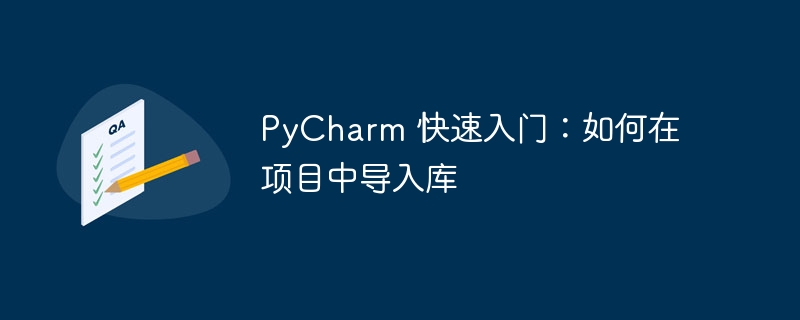

PyCharm is a powerful Python integrated development environment that is widely used by Python developers for code writing, debugging and project management. During the development of Python projects, it is often necessary to import various libraries to extend the functions of Python. This article will focus on how to quickly import libraries in PyCharm and provide specific code examples.
First, we need to ensure that the Python library we need to use has been installed. In PyCharm, we can import installed libraries by following these steps:
import numpy as np. PyCharm provides a powerful auto-completion function that can help us quickly import libraries and reduce errors. When entering the name of a library, PyCharm will automatically prompt possible library names, and you only need to press the Tab key to complete the automatic completion.
Next, we use a specific example to demonstrate how to import the library in PyCharm. Suppose we need to use the numpy library in our project for scientific calculations.
# 导入numpy库
import numpy as np
# 创建一个数组
arr = np.array([1, 2, 3, 4, 5])
# 输出数组的元素个数
print("数组元素个数:", len(arr))
# 计算数组元素的平均值
print("数组元素平均值:", np.mean(arr))In the above example, we first imported the numpy library and used np as an alias to reference the library. We then created an array of 5 elements and calculated the mean of the array elements using the np.mean method.
Through the introduction of this article, we have learned how to quickly import installed libraries in PyCharm, and demonstrated how to use numpy through specific examples. Library for scientific computing. In actual development, correctly importing libraries is the basis for code writing and a key factor in improving code efficiency and accuracy. I hope this article can help readers become more proficient in importing libraries into PyCharm and improve the efficiency and quality of Python project development.
The above is the detailed content of Learn quickly using PyCharm: how to import libraries in your project. For more information, please follow other related articles on the PHP Chinese website!
 How to change pycharm to Chinese
How to change pycharm to Chinese
 pycharm installation tutorial
pycharm installation tutorial
 How to solve the problem that pycharm cannot find the module
How to solve the problem that pycharm cannot find the module
 How to install pycharm
How to install pycharm
 The difference between python and pycharm
The difference between python and pycharm
 How to configure the pycharm environment
How to configure the pycharm environment
 How to install the pycharm interpreter
How to install the pycharm interpreter
 What does pycharm mean when running in parallel?
What does pycharm mean when running in parallel?




